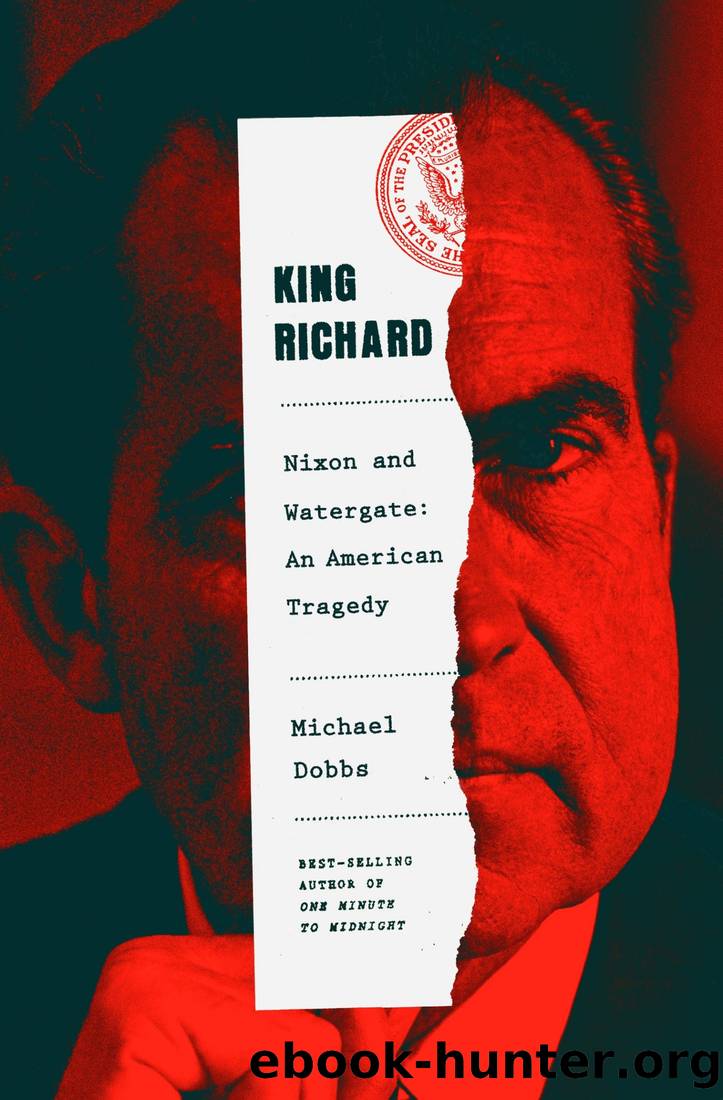King Richard by Michael Dobbs

Author:Michael Dobbs [Dobbs, Michael]
Language: eng
Format: epub
Published: 2021-05-25T00:00:00+00:00
Nixon and Haldeman return to the White House from the Executive Office Building, trailed by Secret Service agents.
Thinking out loud, Haldeman said the main value of the tapes was to help Nixon refresh his memory if other records proved inadequate. By listening to the recording of a particular meeting, he would be able to establish exactly who said what. The problem was that there were now âunbelievable hours of tapeâ piling up in burglarproof safes in a Secret Service storage room on the ground floor of the Executive Office Building. Nixon had made clear he did not trust anyone else to listen to the tapes, with the possible exception of Haldeman. He did not want his longtime secretary, Rose Mary Woods, to hear sometimes disparaging comments about her. He would have to review much of the material himself. The prospect of reliving endless hours of disjointed conversations filled the president with horror. Even poring over transcripts would be painful.
âIâll talk to Kissinger and the rest of them, and Iâll throw out a hell of a lot of things, but Iâm never going to want to read all that crap. I never will.â
For the moment, security was not a problem. Only two Secret Service men knew the combinations to the locked safes. An alarm on the door, connected to the White House Control Center, prevented unauthorized entry or tampering with the tapes. Nevertheless, it suddenly dawned on Nixon that a verbatim record of his every utterance might be a disservice to the historical muse. He had noticed, he told Haldeman, that a reporter who showed up with a tape recorder typically wrote âa lousy story.â Reporters who made notes usually crafted âa much better story.â Sometimes the best stories were written by those who relied on memory alone.
âA tape record is worst of all because thatâs a crutch you lean on totally, but note taking is bad too,â Haldeman agreed, staring up from his ever-present legal pad. âIf you take notes, it releases you from an obligation of concentration.â
Nixonâs mind appeared to be made up. âYou get them all and destroy them,â he told Haldeman, referring to the tapes. If he hired someone to help him write his memoirs one day, he did not want the tapes âto burden us down.â
In their rambling, roundabout fashion, the two men had identified the fatal flaw at the heart of the taping project. By the beginning of April 1973, Nixon had accumulated more than three thousand hours of tape recordings. The audio quality of many of these recordings was poor, sometimes entirely obscured by the rattling of coffee cups or the movement of chairs. To avoid frequent changes of tape, the Secret Service had set the recording speed at 15/16 inches per second, the slowest possible level. Government archivists would later estimate that compiling an accurate transcript of one hour of Nixon tape required a hundred hours of work. At that rate, a lone individual would need almost 150 years to make sense of all the tapes.
Download
This site does not store any files on its server. We only index and link to content provided by other sites. Please contact the content providers to delete copyright contents if any and email us, we'll remove relevant links or contents immediately.
Blood and Oil by Bradley Hope(1558)
Wandering in Strange Lands by Morgan Jerkins(1409)
Ambition and Desire: The Dangerous Life of Josephine Bonaparte by Kate Williams(1380)
Daniel Holmes: A Memoir From Malta's Prison: From a cage, on a rock, in a puddle... by Daniel Holmes(1324)
Twelve Caesars by Mary Beard(1310)
It Was All a Lie by Stuart Stevens;(1291)
The First Conspiracy by Brad Meltzer & Josh Mensch(1166)
What Really Happened: The Death of Hitler by Robert J. Hutchinson(1154)
London in the Twentieth Century by Jerry White(1141)
The Japanese by Christopher Harding(1129)
Time of the Magicians by Wolfram Eilenberger(1122)
Twilight of the Gods by Ian W. Toll(1110)
Cleopatra by Alberto Angela(1091)
A Woman by Sibilla Aleramo(1089)
Lenin: A Biography by Robert Service(1071)
John (Penguin Monarchs) by Nicholas Vincent(1062)
Reading for Life by Philip Davis(1023)
The Devil You Know by Charles M. Blow(1018)
The Life of William Faulkner by Carl Rollyson(976)
